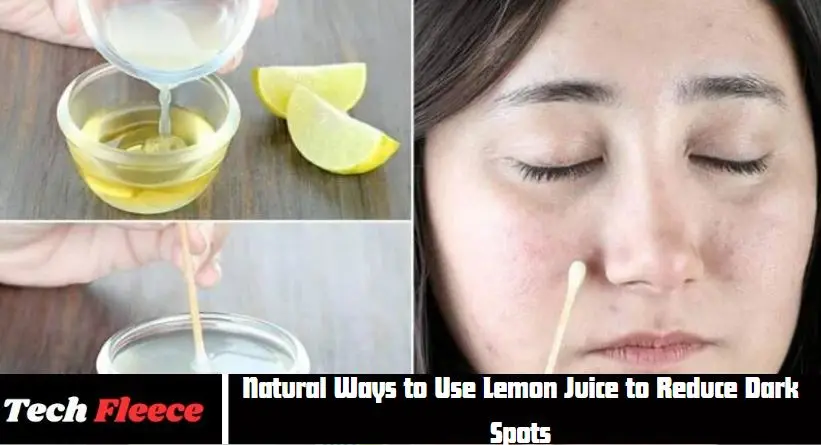Are dark spots on your face bothering you? Discover an effective and natural solution with lemon juice and other home remedies. Dark spots, often caused by sun exposure or aging, can be stubborn to fade. Lemon juice, known for its natural bleaching properties, offers a gentle yet potent solution. Rich in vitamin C, it helps lighten hyperpigmentation and even skin tone over time. Combined with other home ingredients like honey or yogurt, lemon juice forms a powerful treatment that can be easily incorporated into your skincare routine. Say goodbye to dark spots and hello to radiant skin with these simple yet effective remedies!
What are the Causes of Dark Spots on the Face?

Dark spots on the face, also known as hyperpigmentation, can be caused by various factors. Here are some common causes:
- Sun Exposure: UV rays from the sun stimulate melanin production in the skin, forming dark spots or sunspots. This is the most common cause of hyperpigmentation.
- Hormonal Changes: Hormonal fluctuations during pregnancy (melasma or “pregnancy mask”), menopause, or due to hormonal therapies can trigger dark spots to appear on the face.
- Post-Inflammatory Hyperpigmentation: Skin inflammation or injury, such as acne breakouts, cuts, burns, or eczema, can leave dark spots as the skin heals.
- Age: Our skin’s ability to regenerate and repair itself slows down as we age. Accumulated sun damage over the years can result in the appearance of age spots or liver spots.
- Genetics: Some people are genetically predisposed to develop dark spots or have a higher tendency to produce melanin in response to specific triggers like sun exposure.
- Medications: Certain medications, such as antibiotics, hormone treatments, or chemotherapy drugs, can cause hyperpigmentation as a side effect.
- Skin Care Products or Irritants: Harsh chemicals in skin care products, improper use of chemical peels, or frequent exfoliation can irritate the skin and lead to dark spots.
- Nutritional Deficiencies: A lack of essential nutrients, particularly vitamins C and E, can affect skin health and contribute to uneven skin tone.
Understanding the underlying cause of dark spots is essential for choosing the appropriate treatment and preventive measures. Protecting the skin from sun exposure, maintaining a healthy skincare routine, and addressing hormonal imbalances are critical steps in managing and preventing dark spots on the face.
May You Also Like It:
Cassasse- Exploring the Flavors and Culture Behind this Traditional Dish
The Ultimate Guide to Cevıırı – Everything You Need To Know
How is lemon juice effective in removing dark spots?
Lemon juice is effective in removing dark spots due to its natural properties:
- Natural Bleaching Agent: Lemon juice contains citric acid, a natural bleaching agent. It helps lighten dark spots and hyperpigmentation by breaking down melanin pigments.
- Rich in Vitamin C: Lemon juice is rich in vitamin C, which boosts collagen production and promotes skin cell regeneration. This helps fade dark spots and promotes a more even skin tone.
- Exfoliating Properties: Lemon juice’s acidic nature makes it mildly exfoliating. This helps slough off dead skin cells, revealing newer and lighter skin underneath.
- Antioxidant Benefits: Lemon juice’s antioxidants protect the skin from free radical damage, which can contribute to forming dark spots.
- Easy Application: Lemon juice can be applied directly to dark spots or mixed with other natural ingredients like honey or yogurt to enhance its effectiveness and reduce the risk of irritation.
When used consistently and correctly, lemon juice can be a cost-effective and natural solution for improving skin texture and reducing the appearance of dark spots.
Dermatologist Advised 10 Home Remedies That Actually Work
Here are 10 effective home remedies for treating various skin concerns, as recommended by dermatologists:
- Lemon Juice: Rich in vitamin C and citric acid, lemon juice is a natural bleaching agent to lighten dark spots and even skin tone. Dilute it with water or mix it with honey for sensitive skin.
- Aloe Vera: Known for its soothing properties, aloe vera gel can help reduce inflammation, heal wounds, and moisturize the skin. It’s beneficial for sunburns, acne scars, and overall skin hydration.
- Apple Cider Vinegar Contains acetic acid, which helps exfoliate and lighten dark spots. Dilute with water and apply as a toner or mix with clay for a clarifying face mask.
- Honey: A natural humectant and antimicrobial agent, honey moisturizes the skin and promotes healing. It can be combined with lemon juice or yogurt for added benefits.
- Turmeric: Has anti-inflammatory and antioxidant properties that can help reduce acne scars, dark spots, and improve overall skin complexion. Mix with yogurt or honey for a brightening face mask.
- Coconut Oil: Moisturizes the skin and has antibacterial properties. It can be a gentle makeup remover, body moisturizer, or hair conditioner.
- Green Tea contains antioxidants and anti-inflammatory properties that help reduce redness and inflammation. Cooled green tea bags can be used as a compress or applied as green tea extract to the skin.
- Oatmeal: Soothes irritated skin, relieves itching, and is a gentle exfoliant. Mix with water or milk to form a paste for a calming face mask.
- Cucumber: Cucumber has a cooling effect on the skin and helps reduce puffiness. Place cucumber slices on the eyes to reduce dark circles, or blend with yogurt for a refreshing face mask.
- Baking Soda is a mild exfoliant that removes dead skin cells and reduces blackheads. Mix it with water to form a paste for gentle facial scrubbing.
These remedies are generally safe when used appropriately, but a patch test is essential first, especially if you have sensitive skin. Dermatologists recommend consistency and moderation when using home remedies to achieve the best results for your skin concerns.
Do these home remedies work every time?
While home remedies can be effective for many people, their efficacy can vary based on several factors:
- Skin Type and Sensitivity: Different skin types react differently to ingredients like lemon juice, turmeric, or apple cider vinegar. Individuals with sensitive skin may experience irritation or adverse reactions.
- Severity of the Condition: The effectiveness of home remedies can depend on the severity of the skin concern. Mild dark spots or acne scars may respond better to home treatments than more stubborn or deeply rooted issues.
- Consistency and Application: To see results, it is crucial to consistently apply the remedy as recommended. Results may vary if the remedy is not used regularly or applied correctly.
- Underlying Causes: Addressing the underlying cause of the skin issue is essential. For example, addressing these factors alongside home remedies may yield better results if dark spots are due to hormonal changes or medication side effects.
- Individual Response: Each person’s skin is unique, so what works well for one individual may not work the same way for another. Finding the proper home remedy or combination of treatments that work best for your skin may require experimentation.
- Time and Patience: Home remedies typically take time to show noticeable results. Being patient and giving the remedy enough time to work before expecting significant changes is essential.
While these home remedies have benefits and are often recommended by dermatologists, they may only work for some or in some situations. If you have persistent skin concerns or are unsure about home remedies, consulting a dermatologist can provide personalized advice and treatment options tailored to your skin type and condition.
Natural Ways to Use Lemon Juice to Reduce Dark Spots

Certainly! Here are some natural ways to effectively use lemon juice to reduce dark spots on your face:
Direct Application:
- Squeeze fresh lemon juice into a small bowl.
- Using a cotton ball or pad, apply the lemon juice directly onto the dark spots.
- Leave it on for about 10-15 minutes.
- Rinse off with lukewarm water.
- Repeat this process 2-3 times a week.
Lemon Juice with Honey:
- Mix equal parts of lemon juice and honey in a bowl.
- Apply the mixture to the dark spots using a cotton ball.
- Let it sit for 20-30 minutes.
- Wash off with lukewarm water.
- Honey helps moisturize the skin while enhancing the skin-lightening effects of lemon juice.
Lemon Juice with Yogurt:
- Combine 1 tablespoon of lemon juice with 2 tablespoons of plain yogurt.
- Mix well to form a smooth paste.
- Apply the mixture to the affected areas.
- Leave it on for 30 minutes.
- Rinse off with water.
- Yogurt contains lactic acid, complementing lemon juice’s exfoliating and skin-brightening properties.
Lemon Juice with Turmeric:
- Mix 1 tablespoon of lemon juice with 1 teaspoon of turmeric powder.
- Apply the paste onto the dark spots.
- Let it dry for 15-20 minutes.
- Wash off with lukewarm water.
- Turmeric has anti-inflammatory properties and enhances the skin’s radiance with lemon juice.
Lemon Juice with Aloe Vera:
- Mix 1 tablespoon of lemon juice with 1 tablespoon of fresh aloe vera gel.
- Apply the mixture to the dark spots.
- Leave it on for 20-30 minutes.
- Rinse off with water.
- Aloe vera soothes the skin and enhances the skin-lightening effects of lemon juice.
Note:
- Always perform a patch test before applying lemon juice to your face, especially if you have sensitive skin.
- Lemon juice can make your skin sensitive to sunlight, so use sunscreen after using lemon juice treatments during the day.
These natural remedies can help reduce dark spots gradually with regular use, promoting a more even complexion over time.
Side effects and precautions for using lemon on your face

Using lemon on your face can have both benefits and potential side effects. Here are some precautions and side effects to consider:
Precautions:
- Patch Test: Before applying lemon juice to your face, especially if you have sensitive skin, perform a patch test on a small skin area. This helps determine your allergic reactions or sensitivity to lemon juice.
- Dilution: Lemon juice is highly acidic, which can be harsh on the skin, causing dryness, irritation, or even chemical burns. To reduce its acidity and potential for irritation, diluting lemon juice with water or mixing it with soothing ingredients like honey or yogurt is essential.
- Sun Sensitivity: Lemon juice makes the skin more sensitive to sunlight (photosensitivity). After applying lemon juice to your skin, avoid direct sunlight or use sunscreen with a high SPF to protect your skin from UV rays. Failure to do so can lead to sunburn or an increased risk of skin damage.
- Avoid Eye Area: Lemon juice can irritate the delicate skin around the eyes. Avoid applying lemon juice directly near the eyes or on open wounds.
- Limit Frequency: Use lemon juice treatments no more than 2-3 times a week to avoid over-drying or irritating your skin. Consistent and moderate use is crucial in preventing adverse reactions.
Potential Side Effects:
- Dryness and Irritation: Lemon juice’s acidic nature can strip the skin of natural oils, leading to dryness, redness, or irritation. This is more likely if used undiluted or on sensitive skin.
- Hyperpigmentation: In some cases, lemon juice can cause temporary or permanent skin darkening (post-inflammatory hyperpigmentation), mainly if misused or combined with sun exposure.
- Allergic Reactions: Some individuals may be allergic to citrus fruits like lemons. Allergic reactions can manifest as itching, redness, swelling, or hives. Discontinue use if you experience any allergic symptoms.
- Increased Sensitivity: Prolonged or excessive use of lemon juice on the skin can compromise the skin barrier, making it more sensitive to other skincare products or environmental factors.
Tips for Safe Use:
- Always Dilute: Mix lemon juice with water or other soothing ingredients like honey or yogurt before applying it to your face.
- Rinse Thoroughly: After allowing lemon juice to sit on your skin for a short period (10-15 minutes), rinse it off with lukewarm water to prevent prolonged exposure to acidity.
- Moisturize: After using lemon juice, follow up with a gentle moisturizer to replenish lost moisture and help soothe the skin.
By following these precautions and being aware of potential side effects, you can safely incorporate lemon juice into your skincare routine to help lighten dark spots and improve skin tone. If you experience severe irritation or discomfort, discontinue use and consult a dermatologist for alternative treatments.
Frequently Asked Questions
How does lemon juice help in reducing dark spots?
Lemon juice contains citric acid, which acts as a natural bleaching agent. It helps lighten dark spots and hyperpigmentation by breaking down melanin pigments and promoting skin cell turnover.
Is lemon juice suitable for all skin types?
Lemon juice can be harsh on sensitive or dry skin. Doing a patch test before applying it directly to your face is advisable. Diluting lemon juice with water or mixing it with soothing ingredients like honey or yogurt can reduce the risk of irritation.
How often should I use lemon juice to see results?
Results vary based on individual skin types and the severity of dark spots. Generally, using lemon juice treatments 2-3 times a week can gradually lighten dark spots over time. Consistency is vital in achieving noticeable results.
Are there any side effects of using lemon juice on the skin?
Lemon juice can make the skin more sensitive to sunlight, increasing the risk of sunburn and skin damage. It may also cause dryness or irritation, mainly if applied undiluted or to sensitive skin types. Using sunscreen and moisturizing after treatment can help mitigate these effects.
Can lemon juice be combined with other ingredients for better results?
Yes, lemon juice can be mixed with honey, yogurt, turmeric, or aloe vera to enhance its effectiveness and moisturize the skin. These combinations can provide additional benefits, such as soothing irritated skin and boosting the lemon juice’s skin-lightening properties.
How long does it take to notice improvements in dark spots?
Visible improvements in dark spots can take several weeks to months, depending on individual skin response and the consistency of treatment. Patience and regular application are essential for achieving desired results.
Can I apply lemon juice overnight for faster results?
It’s not recommended to leave lemon juice on the skin overnight due to its acidic nature, which can cause irritation or dryness. Applying it for a limited time (10-15 minutes) and rinse thoroughly with water is best.
Conclusion
It’s difficult to say how long it will take for these remedies to remove dark spots from your face because it depends on your skin type, your skin condition, and how these specific components work on your skin. Lemon juice is one of these natural remedies that you can choose over-the-counter creams. Lemon juice is rich in vitamin C and antioxidants, acting as a natural bleaching agent to reduce hyperpigmentation and dark spots. To reduce dark spots, you can mix lemon juice with turmeric, coconut oil, tomatoes, or baking soda. Remember to avoid going out in the sun after applying lemon juice to your skin because it can make it sensitive to UV rays.

